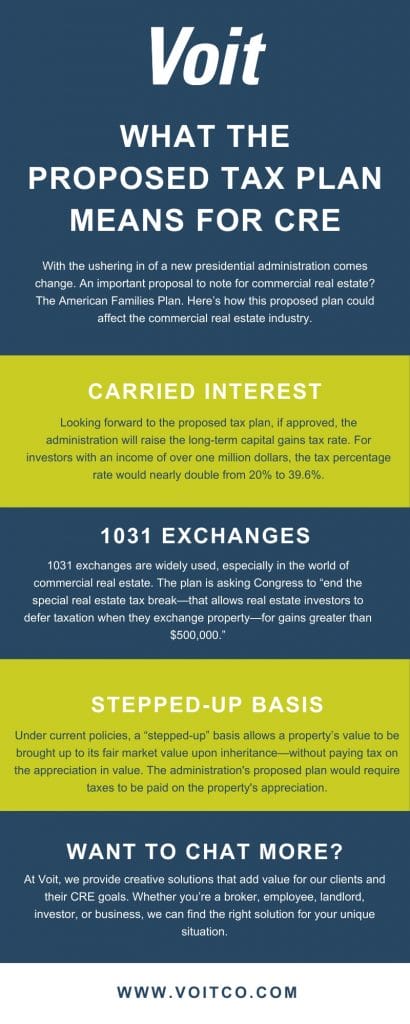
With the ushering in of a new presidential administration comes change. An important proposal to note for commercial real estate? The American Families Plan. Here’s what its proposed tax plan means for commercial real estate.
According to the White House, The American Families Plan seeks to “make education more affordable… provide economic security for families, and expand tax credits that help workers and families.” Additionally, it is projected to stimulate the economy with over $1 trillion in new spending.
Also included in this new plan: a proposed tax reform agenda that targets three common incentives used in real estate—1031 exchanges, carried interest, and the stepped-up basis.So, here’s how this proposed plan could affect the commercial real estate industry. Cut and dry, from Voit Real Estate Services.
Carried Interest
The benefit of carried interest is relevant to any private equity investment. According to The Street, carried interest is defined as “a percentage of the profits generated by a hedge fund or private equity fund.”
This percentage is typically included in the managing partner’s compensation. As such, carried interest plays an important role in encouraging the fund’s performance.
Currently, carried interest is seen as a return on investment. Being so, it’s taxed right now at 20% capital gains as opposed to the regular income tax rate of 37% (for those whose incomes are over one million dollars.)
Looking forward to the proposed tax plan, if approved, the administration will raise the long-term capital gains tax rate. For investors with income over one million dollars, the percentage would nearly double from 20% to 39.6%.
For those, however, that lie beneath that one million dollar threshold, the tax rate would adjust to whatever federal rate the owner is currently at (i.e. 10%, 12%, 22%, 24%, 32%, 35%, or 37%).
1031 Exchanges
1031 exchanges are widely used in the world of commercial real estate. A 1031 exchange allows a property owner—when selling an investment property—to defer the payment of capital gains taxes by reinvesting the proceeds from the sale into another property or properties that qualify as “like kind” under IRS rules. In simple terms, it allows a swap of one investment property for another.
The administration, according to a fact sheet released by the White House, is asking Congress to “end the special real estate tax break—that allows real estate investors to defer taxation when they exchange property—for gains greater than $500,000.”
It’s important to consider that most commercial properties that are sold create taxable capital gains well over the $500,000 proposed limit. This could affect the balance of supply and demand, as investors would probably hold onto their properties for longer than they would have if 1031 exchanges were not eliminated.
What should the commercial real estate world anticipate if 1031 exchanges are limited? Initially, supply would increase as more properties would be exchanged prior to the new law taking effect. However, transaction volume is likely to go down over the long term, as investors hold their properties longer to delay taxable events.
As the last asset class to enjoy the benefits of 1031 exchange rules, real estate holds an advantage over other forms of investment that offsets the higher risk of its illiquid nature. Without that advantage, those acquiring real estate assets would add an additional risk premium in their underwriting, resulting in downward pressure on pricing.
Stepped-Up Basis
Capital gains regarding inherited properties might also be affected. Under current policies, a “stepped-up” basis allows an inherited property’s value to be brought up to its current and fair market value upon inheritance. Under the current rule, assets can be passed down without paying capital gains tax on the appreciation in value, from the original purchase price.
The administration’s proposed plan, however, would require taxes to be paid on the property’s full appreciation. For example, let’s say an estate was purchased at $2 million. By the time of inheritance, however, the property is worth $5 million. Under the proposed change, capital gains tax would need to be paid on the $3 million increase, if the property was sold.
Want To Chat More?
At Voit Real Estate Services, we provide creative solutions that create value for our clients and their commercial real estate goals. Whether you’re a broker, employee, landlord, investor, or a business looking for the right space, contact us today so we can find the right solution for your unique situation. Or, if you’re interested in learning more about what the administration’s proposed tax plan means for you, connect with us here.
